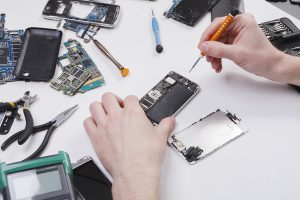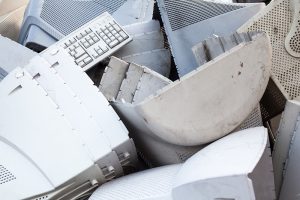
Companies that sent tens of millions of pounds of CRT materials to Closed Loop Refining and Recovery are publicly responding to lawsuits naming them as defendants.
 Associate Editor Jared Paben has worked for Resource Recycling since December 2014. Most of his earlier career was spent as a reporter for the daily newspaper in Bellingham, Wash., but he also has experience working for the Oregon volunteerism commission and for Oregon nonprofits serving low-income populations. He can be contacted at [email protected].
Associate Editor Jared Paben has worked for Resource Recycling since December 2014. Most of his earlier career was spent as a reporter for the daily newspaper in Bellingham, Wash., but he also has experience working for the Oregon volunteerism commission and for Oregon nonprofits serving low-income populations. He can be contacted at [email protected].
Companies that sent tens of millions of pounds of CRT materials to Closed Loop Refining and Recovery are publicly responding to lawsuits naming them as defendants.
 A federal agency is exploring OEM impediments to the repair of electronics. Meanwhile, the New York Times editorial board came out in favor of right-to-repair laws.
A federal agency is exploring OEM impediments to the repair of electronics. Meanwhile, the New York Times editorial board came out in favor of right-to-repair laws.
![]() A proposed update to the R2 standard has been crafted with an eye toward emphasizing reuse, boosting data protection requirements and improving device testing and repair, according to Sustainable Electronics Recycling International.
A proposed update to the R2 standard has been crafted with an eye toward emphasizing reuse, boosting data protection requirements and improving device testing and repair, according to Sustainable Electronics Recycling International.
 A North Carolina startup is working to scale up its ability to generate investment-grade gold from e-scrap components.
A North Carolina startup is working to scale up its ability to generate investment-grade gold from e-scrap components.
 Two ITAD companies recently released reports providing insights into serving institutional generators of obsolete electronics.
Two ITAD companies recently released reports providing insights into serving institutional generators of obsolete electronics.
 Researchers overseas say high-impact polystyrene from scrap electronics can be used as a replacement for sand in self-compacting concrete.
Researchers overseas say high-impact polystyrene from scrap electronics can be used as a replacement for sand in self-compacting concrete.

More than a quarter of consumers are so concerned that data on their old mobile phones might be compromised that they wouldn’t trade in the devices, according to a survey.
 Metals company Boliden recovered copper and precious metals from 95,000 short tons of printed circuit boards in 2018, up 12 percent year over year, according to an annual report.
Metals company Boliden recovered copper and precious metals from 95,000 short tons of printed circuit boards in 2018, up 12 percent year over year, according to an annual report.
Photo shows the tracking device on a laptop displaying the tracking software interface.
Of 170 trackers placed in e-scrap devices over the past two years, the vast majority remained in the U.S. Most of those electronics that were exported went to Asia, according to the Green Tracking Service.
Continue Reading

Todd Koleski and Jennifer Ganka of Defense Logistics Agency Disposition Services
It’s well-known the U.S. military is a huge buyer of goods, including electronic equipment. Officials recently shed light on how the Department of Defense approaches disposition.

